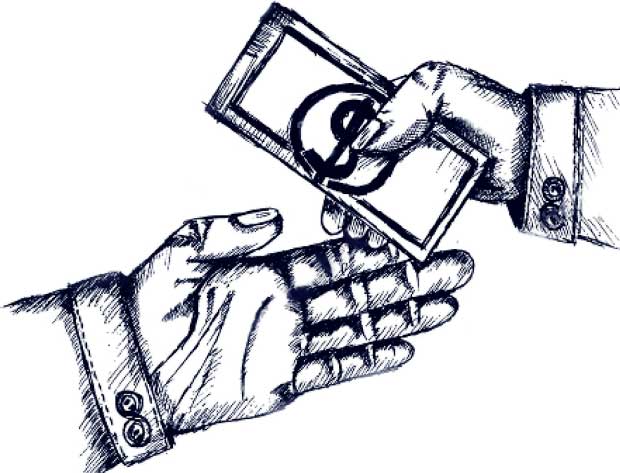Reply To:
Name - Reply Comment
“Power does not corrupt. Fear corrupts... perhaps the fear of a loss of power.”
- John Steinbeck
Political power is not just a tool in the hands of those who hold it. It is not a license that guarantees immunity for all crimes that are committed under the cover of that license. It is not a power vested in the holder to run amok with all what is inside the national coffers. It does not give any power whatsoever to those who wield it with unlimited and unchecked supremacy to decree what is right and what is wrong. Political power is an instrument of trust; it is a time-barred mechanism that is invested with a great deal of constraints and controls; it is a sacred oath taken by those who are elected by voters with infinite faith and belief that the power so invested would not be abused or used against justice and fair-play. That power cascades from the rule of law which is the core and soul of a civilized people. It flows from our constitution.

Yet, when the Constitution is silent on any subject of socio-political dynamic, then come statutes, convention and precedent. If all that is absent, natural law takes over. What is reasonable to reasonable people is conventionally described as follows:‘Natural law refers to the use of reason to analyse human nature to deduce binding rules of moral behaviour from the dawn of civilization’. However, it is not my intention to venture into a legal debate over an analysis of these nuanced theories of natural law. Political power as assumed by most of our politicians goes way beyond the constitutional and moral boundaries. Corruption of that power, corruption of that sublime faith and confidence people have reposed on that political power, has been the most visible and palpable occurrence before our very eyes. People’s faith and confidence so endowed on politicians has been desecrated and debased. That process of desecration and degradation did not begin yesterday or the day before. In fact, corruption of political power is as old as the concept of political power itself.
Let us not go into the sordid history of corruption of political power through the ages. Let us confine ourselves to the Sri Lankan context. Corruption of power does not happen in a vacuum. It does not exist in a world devoid of all other related or unrelated socio-political forces at work. It is happening in the midst of varied and conflicting paradigms of social forces and human enterprise. Whenever and wherever money is involved, whenever spending of others’ cash and assets, the human being tends to be more elastic in his spending habits and that elasticity extends beyond an endurable limit when  he or she realizes that whatever the venture they are engaged is under their control. A corrupt mind identifies the vulnerable limits or lack thereof; that mind sees a hidden commission in a road development project; that mind sees a concealed sub-contract that could be handled by his brother-in-law or his wife’s cousin. A corrupt mind sees what in corrupt minds don’t see. Corruption of power has been in play for the last six or seven decades. It has never evaporated. On the contrary, it has grown exponentially and those practitioners of corruption have multiplied, especially in the company of nepotism. Nepotism allows corruption to grow out of control. An avaricious mind that is already corrupt unilaterally decides that all collections of such ill-gotten wealth must be held within the realm of their kith and kin.
he or she realizes that whatever the venture they are engaged is under their control. A corrupt mind identifies the vulnerable limits or lack thereof; that mind sees a hidden commission in a road development project; that mind sees a concealed sub-contract that could be handled by his brother-in-law or his wife’s cousin. A corrupt mind sees what in corrupt minds don’t see. Corruption of power has been in play for the last six or seven decades. It has never evaporated. On the contrary, it has grown exponentially and those practitioners of corruption have multiplied, especially in the company of nepotism. Nepotism allows corruption to grow out of control. An avaricious mind that is already corrupt unilaterally decides that all collections of such ill-gotten wealth must be held within the realm of their kith and kin.
In such a corrupt and crooked circumstance, the power of the politician grows and its growth is fearful and dangerously uncontrollable if it seems, at least in the eye of the holder of that power, long-lasting and permanent. That corruption of power now becomes subordinate to the power of corruption. The power of corruption now holds enormous weight and dangerous dimensions and the consequences of that power in turn produces a chain of socio-political anomalies which become regular to the eye of the victims of that power. That is what precisely happened during the reign of the Rajapaksas. They had the power. That power was conclusively corrupted, it was desecrated and defiled beyond all recognition and in the twenty first century, it was the siblings and the immediate family of Mahinda Rajapaksa that accelerated the pace of this dreadful cycle of corruption of power and power of corruption. Corruption of power was refined and an ugly thread of nepotism was woven into that dark fabric of corruption. What is in display in the various allegations and charges against the Rajapaksas is that fabric- a fabric that is framed in constitutional powers legitimately granted to President of the country - but depicting a grossly interlaced jumble of patterns with prominent threads of nepotism intervening the beauty and delicacy of political power.
Not only our average voter, the so-called super-elites in Colombo too are seeking refuge under a leaky roof of binary choices
It is indeed a tragedy that this pattern was embraced by the so-called elite of the country. This elite is essentially a class of heavy-moneyed and unscrupulous businessmen and women whose idol was the then President of the country. The politicians were corrupt, the civil service was corrupt, lower levels of government service were corrupt and even minions such as drivers and peons were corrupt.
It is extremely hard to rid oneself of these agents of corruption. Society in total was being eaten into by these worms. These are the worms that populate the cocktail circuit; they are the ones who travel to and from the airport when the President goes and comes back from abroad; they entertain the first family in a fashion that surpasses all royal banquets. Not that this did not happen during the times of other regimes. It did happen; the difference is the magnitude of the monies involved, frequency of events and nepotism that surrounded the orgy of corruption. Such a debauchery of political power, its corruption by its holders, the callousness with which the underlings were treated, sheer arrogance of the siblings and immediate cohorts, they all fashioned an illusion of ever-lasting power, a power which could do,more or less,anything and everything.
The pugnacious and aggressive attitude of these cohorts was such they could close a section of a main road if and when they were dining inside a restaurant located along that road. When the ‘brother’ travelled on road, it was closed a way ahead of time, causing irritating traffic jams in Colombo and elsewhere. Such was the power of corruption. When one brother had to go outside Colombo, his Mercedes or the BMW was transported on a special long-bed truck while he flew by helicopter - all this at the expense of the local taxpayers’ money. Such was the power of corruption.
Last week I happened to be at a get-together of a school fraternity and while helping ourselves to scrumptious dinner we invariably sailed into a not-too-stormy discussion about politics. One fellow started criticizing the present government and in a most negative way stated that that nothing is moving, meaning that unlike during the previous regime, everything is at a standstill. I noted that the person who uttered such an ‘illuminating’ critique was a chairperson of a major state-owned institution during the last regime. Everyone around him was silently nodding, acknowledging the partial validity of the statement. Encouraged by the almost-unanimous nodding of his listeners, he went on attacking the various Ministers of the current government, until one of them looked into the eyes of the critic and stated thus: ‘I will accept everything you uttered, but getting rid of the Rajapaksas alone is good enough for me and for the betterment of the country. That alone could justify the existence of the present government’. No one dared to challenge the validity of that statement. The ex-chairperson’s silence was deafening.
Corruption of power does not happen in a vacuum. It does not exist in a world devoid of all other related or unrelated socio-political forces at work. It is happening in the midst of varied and conflicting paradigms of social forces and human enterprise
Rajapaksas’ corruption of power and power of corruption were intertwined. In terms of the cause and effect theory, one gave effect to the other. The cycle of corruption of power and power of corruption will continue to generate ugly results for the country, devouring the best talents who are our civil servants and throwing them under the bus by the very politicians who happen to nurture them. Wesley Eugene Fesler was a famous American football, basketball, and baseball player and coach of football and basketball. He once said thus: ‘hypocrisy is the audacity to preach integrity from a den of corruption’. The Rajapaksas belong in that den.
Walled within this catacomb of choices the average Sri Lankan is looking for one way or the other. What is before us is not a binary choice. The issue before us is multifaceted and multilayered. Not only our average voter, the so-called super-elites in Colombo too are seeking refuge under a leaky roof of binary choices. All of us seldom realize that the outside-shower is drenching us all without mercy and without discrimination. The showers of criticism are as good an equalizer as rainwater pouring from the skies.
The writer can be contacted at [email protected]